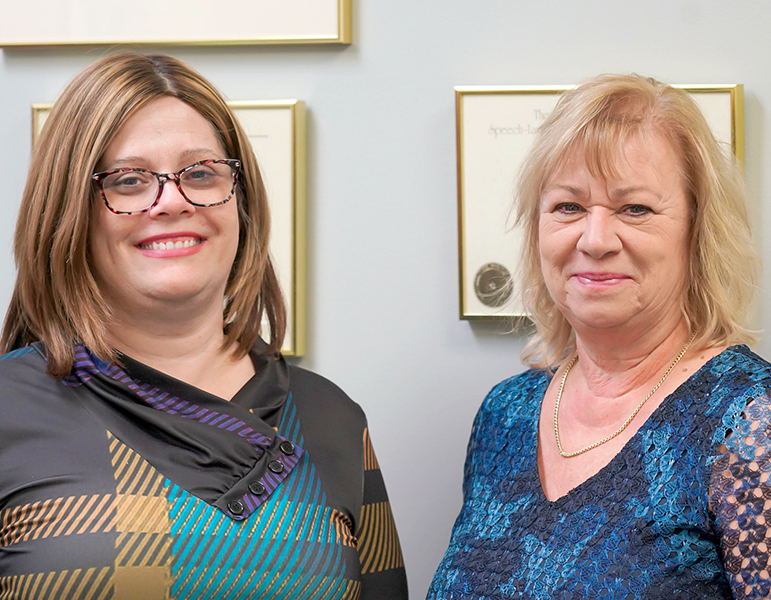WINGHAM – Harmony Hearing opened its doors on Oct. 3 at 302 Josephine St. (right across from the post office) and offers much more than hearing tests.
Audiologist Susan Schlacht is pleased to be in town and hopes to meet you soon. She wants people to know she is now available to assist the people of Wingham and surrounding areas with their hearing health.
As a licensed audiologist with 34 years of experience, Schlacht is qualified to see children six months or older up to senior-aged people.
Personal Care Coordinator Dawn Baxter is currently training under Schlacht to become a hearing instrument specialist, and is very knowledgeable about hearing health. She is there to greet you, answer questions and help with the registration process.
Together, the pleasant duo wants to make your visit to the clinic a comfortable and informative experience.
The clinic has state-of-the-art technologies with everything necessary for on-site hearing health evaluation.
Hearing assessments are conducted in the full sound booth, where they measure hearing.
Harmony Hearing does assessments and orders for hearing aids, including fittings on-site. They also do repairs, even if you didn’t purchase your device from them.
“If somebody purchased a hearing aid from elsewhere, and they need servicing, we adopt them into our clinic as a family and take care of them that way,” said Schlacht.
“I do children’s testing,” Schlacht continued. “I also do central auditory processing testing for kids that have difficulty at school listening and processing what they hear, so we assess for that.”
Additional products available from Harmony Hearing include swim plugs, nose plugs, snore plugs, musician’s earplugs, and custom moulds.
Schlacht and Baxter talked about the current studies linking hearing loss and cognitive decline in some people.
The pair are currently working on an article for publication regarding this, which should be ready soon.
According to a report published by the Lancet Commission (July 30, 2020), hearing loss is the largest modifiable risk factor against dementia. “In fact, moderate hearing impairment can increase one’s risk of dementia by threefold. This is due to the fact that hearing loss leads to lowered mental stimulation, isolation, and ultimately, cognitive decline. Fortunately, hearing aids have been shown to help protect against cognitive decline by keeping the brain actively engaged in everyday life,” states the report.
Baxter has personal experience with this and permitted Midwestern Newspapers to share her story.
“This is a good time to be doing this, because it’s Alzheimer’s Month,” said Baxter as she began.
Baxter’s partner, MaryBeth Wighton, has a form of dementia, and she started having issues with her hearing.
“She has what’s called hyperacusis. It’s an auditory processing, so everything always seems really loud. And then on top of that, she has tinnitus, which is the ringing in the ear, and the constant ringing in the ear. This was probably brought on by the cognitive decline,” Baxter said.
At that time, they were not aware of the correlation between dementia and cognitive impairment; they just knew that they couldn’t go out and do “normal” activities like listen to live music or even go to a restaurant; the background noise was too overwhelming for Wighton.
“So we went to see Sue, and there’s a couple of different things that Sue was able to do, which is helping MaryBeth extremely well,” said Baxter. “So musician plugs, that helps with the hyperacusis. When we go out, and we’re around a lot of noise and that sort of stuff, it filters out all that background noise.
“So we’re able to go to live music now and go to restaurants and do those types of activities where we weren’t doing them for years because it was too much. Or if we did, we’d go at three o’clock when nobody was there.
“Tinnitus and hyperacusis can really be crippling, it really changes your way of life. And then with the constant ringing in the ears, it’s exhausting.”
Baxter mentioned the misconception that nothing can be done about this problem, saying several things can help alleviate the discomfort.
“So once again, we met Sue, and she’s like, ‘you know, it’s not necessarily going to work for everybody, but let’s get you some hearing aids so we can do some tinnitus management’,” Baxter said. “Whole new person. It’s just unbelievable.”
Schlacht and Baxter hope that a hearing health evaluation will soon be a “box to check” on the whole health checklist when people see their physician.
If you or someone you know is suffering from any of the above symptoms or noticing a decline in their hearing, Harmony Hearing is an excellent place to visit, regardless of age.
“The advantage to Sue being an audiologist is that she can work with kids, a lot of places, they have hearing instrument specialists, which are fantastic, but they can’t do the work with kids that Sue can do being an audiologist,” said Baxter. “She has the tinnitus management, and then she has the experience with cognitive impairment.”
The 2020 report by the Lancet Commission states that 12 modifiable risk factors from childhood to late life could delay or prevent 40 per cent of dementia cases.
Of these 12 risk factors, untreated hearing loss in midlife remains the largest modifiable risk factor of dementia. Additionally, the risk of dementia varies based on the level of hearing loss.
Mild hearing loss doubles the risk of dementia.
Moderate hearing loss triples the risk of dementia.
Severe hearing impairment increases the risk of dementia by up to five times that of those who do not have hearing impairment.
The recent study by the Lancet also cites that “hearing loss might result in cognitive decline through reduced cognitive stimulation.” The study further recommends the use of hearing aids in those with hearing loss as a way to protect against cognitive decline.
Harmony Hearing is open for appointments from Monday to Thursday 9 a.m. – 4:30 p.m.
Contact information: 519-912-2121 or email at harmonyhearing@hurontel.on.ca.



